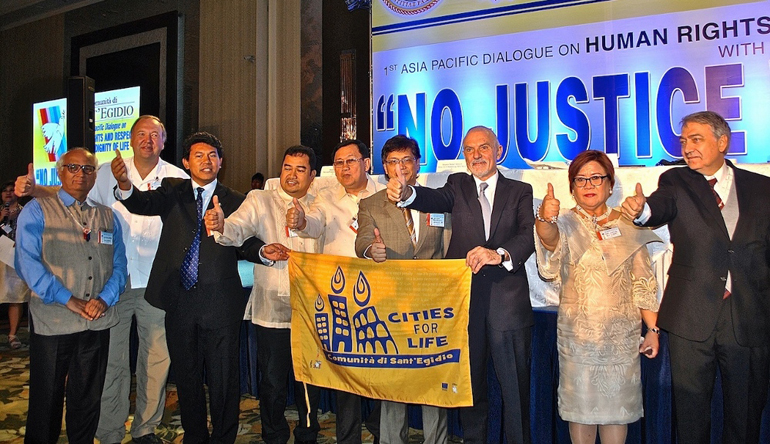
From left: Sudheendra Kulkarni, Arthur Laffin, Leonardo Tranggono, an unnamed conference attendee, Manuel Co, Benjamin Abalos Jr., Alberto Quattrucci, Leila de Lima, and Mario Marazziti flash thumbs-up sign in support of life, not the death penalty. (N.J. Viehland)
Hundreds of people who gathered at a public square here for a rally against the death penalty lit candles and joined in singing "Heal the World" to close a historic dialogue on human rights and respect for the dignity of life.
It may have ended months of work for the first Asia Pacific dialogue on the theme "No Justice without Life." But Mayor Benjamin Abalos Jr. and other speakers pointed out that much work remains for Filipinos to foster dialogue on the death penalty and ensure that the country's laws do not again allow executions.
The Oct. 27-28 conference was co-organized by Mandaluyong City, the Department of Justice and members of the Rome-based Community of Sant'Egidio, a lay Christian community.
Mandaluyong, east of Manila, belongs to the network of more than 1,600 cities around the world that have declared themselves "Cities for Life," committed to raising awareness about the death penalty. Abalos, addressing a gathering organized by Sant'Egidio in Rome, offered Mandaluyong as this year's venue for its dialogue on human rights and the respect for the dignity of life.
More than 30 mayors from around the Philippines attended the sessions with government and law enforcement officials, religious leaders and scholars, members of international and civic organizations, and activists. Philippine Justice Secretary Leila de Lima, as well as an undersecretary and directors of the department, lent support. Foreign participants came from Cambodia, India, Italy, Japan and the United States.
The closing program, which was open to the public, included words from victims' relatives, letters from prisoners on death row, prayers and singing. Seven participants from various countries read the final appeal to stop the death penalty.
The appeal summarizes reasons for their opposition to the death penalty, including a lack of evidence that capital punishment deters crime or makes life safer and its failure to bring closure to victims' families.
In their appeal, supporters committed "to work to create a larger consensus to the call for a universal moratorium on executions, adopted by the majority of countries" at the U.N. General Assembly. "We ask our governments and the governments of the world to be pro-active in supporting and implementing this Resolution," dialogue participants said.
In 2007, the United Nations first approved a resolution calling for a moratorium on executions, restrictions on the number of offenses punishable by death penalty, and respect for the rights of people on death row. The General Assembly is expected to vote in November on a new resolution, according to Mario Marazziti, president of the Italian Parliament's Commission for Human Rights.
While the votes are not binding, Marazziti noted that the resolutions and dialogue have helped countries that retain the death penalty move toward abolishing it. He cited among examples Gabon, Mongolia, Uzbekistan, Kyrgyzstan, Turkmenistan and Benin, as well as various states in the United States.
In his view, Marazzitti said, the Philippines has "the authority today and the credibility to encourage the abolition process in Asia."
Keeping watch
In Southeast Asia, the Philippines and Cambodia are the only two of 10 governments that do not allow the death penalty, Abalos noted in his welcome address. Indonesia allows execution by firing squad, Malaysia and Singapore by hanging, and Thailand and Vietnam by lethal injection.
There have been no recorded executions in Brunei since 1957 or in Mayanmar since the 1980s. Nor has Laos reported executions for a long time, Abalos said.
The history of the death penalty in the Philippines shows people must be vigilant, Abalos said, even in a country where 93 percent of the population are Christians, and "Filipinos believe in the sanctity of life."
Then-President Corazon Aquino abolished the death penalty in 1987. Her successor, Fidel Ramos, enacted the Death Penalty Law, which reinstated the death penalty for 46 crimes, and another law mandating lethal injection as the method.
Executions started in 1999. Despite seven executions under President Joseph Estrada, the national crime volume increased 15.3 percent that year, Abalos said.
Estrada later placed a moratorium on the death penalty after a church-led clamor, but his successor, Gloria Arroyo, lifted the moratorium in 2003 during a spate of kidnappings for ransom. Then, in 2006, Arroyo changed course, enacting a law banning the death penalty and imposing life imprisonment instead.
Arroyo also commuted the death sentences of 1,230 death row inmates to life imprisonment of a minimum of 30 years.
"The fight is not over," Abalos said, citing a bill filed in Congress seeking to impose the death penalty for drug trafficking.
He assured participants from Sant'Egedio and other advocates, "As mayor of Mandaluyong, let me say we are one with you."
The number of countries that do not impose the death penalty has increased from 20 in the mid-1970s to 140, Marazziti said. However, the number of recorded executions in countries increased from 682 in 21 countries in 2012 to 778 in 22 countries in 2013.
The figures do not include numbers from China, Syria and Egypt, which Amnesty International could not verify. Almost 80 percent of executions outside these countries were recorded in Iran, Iraq and Saudi Arabia. The United States was the only country in the Americas that carried out executions.
Encounter
The Community of Sant'Egedio, which claims 50,000 members in 70 countries, attracted a variety of people to the conference.
College Freshman J.C. Mangmang told NCR that Manuel Co, head of the Parole and Probation Administration in the Philippines, moved him to see the issue differently. Co during the dialogue talked about his experiences of riots in the national penitentiary when he served as a prison guard.
Co recalled the days when he was in charge of switching on the electric chair. "My knees then were trembling and my conscience was bothering me," he said. He said when then President Ferdinand Marcos called off an execution in the last minute so the case could be reviewed, he felt relieved.
Mandaluyong resident Rose Katilogo told NCR she was "surprised" and "inspired" to hear de Lima speak candidly of her disfavor for death penalty.
"I hope the other officers of the Justice Department have the same attitude and that her words will have some impact on ordinary people's lives," Katilogo said.
At the rally, de Lima said her job as secretary of justice is to arrest and prosecute alleged offenders, not order their killing. "None of us has the mandate or right to order the killing of any person."
The death penalty especially harms the poor who cannot afford to pay for good lawyers, she added, and has not been shown to deter crime.
"The truly effective deterrent to crime is to ensure that our police and investigators, our prosecutors and judges are doing their job well, because the best deterrent to criminality is certainty of punishment," she said.
[N.J. Viehland is a correspondent for National Catholic Reporter based in the Philippines.]




